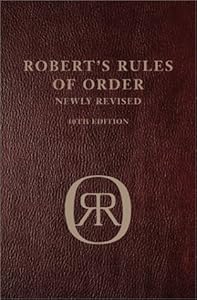
Despite the fact that most people claim to use Robert's Rules of Order for parliamentarian procedure, few do so. Even fewer realize it, and still fewer have actually read the book. Being one of the very few sometimes gets to be a pain, at least if you want things to go by the book.
Some common examples of procedures that are not according to Robert but done are to call for a vote for a motion followed with saying, "Those opposed by the same sign." If the vote is by the same sign, it is a vote for the motion and not against. One of the matters that bugs me the most is when something is "Laid on the Table." The proper motion is to postpone for a set (indefinite is acceptable) time. The Lay on the Table motion is to set something aside to handle an urgent, pressing matter, which is then followed by resuming the first motion. Oftentimes, the Lay on the Table motion is used to kill a matter that no one wants to vote on. At a recent City Council meeting I witnessed the Council repeatedly vote to suspend the rules. It was the correct motion, (since they wanted to avoid a vote on Unanimous Consent and consider something for immediate adoption rather than wait for another meeting) but the point here is that it is a regular occurrence to suspend the rules. Why have the rules if you're going to simply suspend (or ignore) them?
Organizations and governmental bodies do things the same way. They believe they are right, but the reality is they are just as wrong as the last person they saw doing it. Copying the last group has become the norm. Everyone expects things to run by the same procedure as before.
As Christians we are often similarly comfortable. We want our church services to be the same, the preacher to finish on time, the prayers to last as long, etc. Many times we want to deal with people in a certain way and for a set period of time or when nothing is bothering us. When we are annoyed we act differently. As C.S. Lewis put it in the Problem of Pain, "Everyone feels benevolent when nothing happens to be annoying him at the moment."
Just like the complacency in parliamentarian procedure, we get complacent in our Christianity copying those that came before us. Every now and then we need someone to come along and remind us to read the Book.


